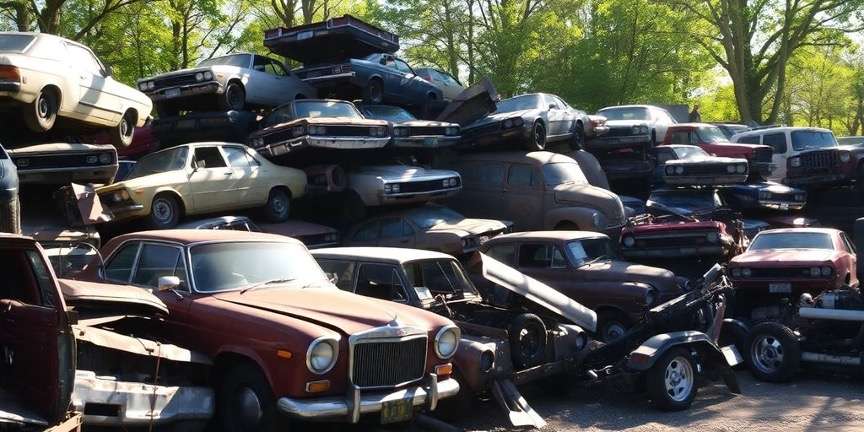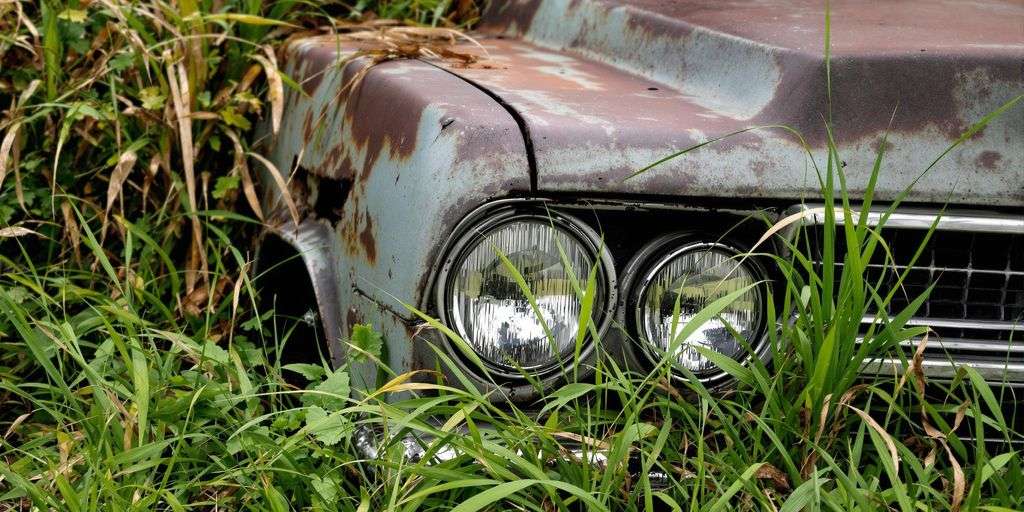Key Takeaways
- Understand your car’s condition and market value before selling.
- Gather all necessary paperwork like title and registration.
- Choose a reputable junkyard by checking reviews and credentials.
- Decide on transportation: towing or driving the car yourself.
- Finalize the sale by negotiating a fair price and completing paperwork.
Understanding the Value of Your Junk Car
Assessing the Condition of Your Vehicle
Before you even think about selling your old car, take a good look at its overall condition. This means checking for any obvious damage, rust, or parts that might be missing. The condition of your car is a big factor in determining its worth. You should also note any parts that are still working well, like the engine or tires. This will help you decide if you should sell the car as a whole or just sell it for parts.
Researching Market Value and Trends
Next, you'll want to do some homework on what similar cars are going for in the market. This means looking up prices online or even checking with local junkyards. The market for junk cars can vary a lot, so it's smart to get a sense of the going rates. Keep an eye on the value of a junk car which is primarily influenced by its overall condition, including whether it is still operational or completely inoperable. Knowing the market trends will give you a better idea of what to expect when you start getting offers.
Getting an Appraisal from Junkyards
Finally, consider getting an appraisal from a few junkyards. This is a great way to get a realistic idea of what your car is worth. Different junkyards might offer different prices, so it's worth contacting a few to see what they say. And remember, it's not just about finding the highest offer; you also want to make sure you're dealing with a reputable buyer. Once you've gathered a few appraisals, you'll be in a much better position to negotiate and make a final decision.
Preparing Your Junk Car for Sale

Cleaning and Tidying Up Your Car
First things first, you want your car looking its best, even if it's headed to the junkyard. A clean car can sometimes fetch a better price. Give it a good wash, vacuum the interior, and clear out any trash. If you have time, a quick wax can make the exterior shine a bit more. Remember, presentation matters, even for a junk car.
Gathering Necessary Documentation
Having all your paperwork in order is crucial. Make sure you have the car's title, any maintenance records, and a bill of sale ready. If you've misplaced your title, contact your local DMV to get a replacement. This paperwork not only proves ownership but also helps the sale go smoothly.
Removing Personal Belongings
You'd be surprised at what gets left behind in cars. Double-check every nook and cranny—glove compartments, under seats, and in the trunk. Remove all personal items and documents. It's easy to overlook things, so take your time to ensure nothing important is left behind.
Finding the Right Junkyard

Exploring Local Junkyard Options
First off, you gotta know what's around you. Start by jotting down a list of junkyards nearby. Consider how close they are to your place and what types of cars they usually take. Some junkyards might specialize in certain makes or models, so keep that in mind. It's like picking the right store for your needs.
Reading Reviews and Checking Credentials
Once you've got a list, it's time to do some homework. Look up reviews online to see what other folks have said about these places. Make sure the junkyard is legit and follows local rules and regulations. A good reputation can be a lifesaver here. You don't want to deal with a shady operation.
Contacting Junkyards for Inquiries
Now, reach out to the junkyards you're interested in. Ask them about their process, what paperwork you'll need, and how they handle pricing. It's important to have clear communication so there are no surprises. You might even want to make a list of questions beforehand to make sure you cover all the bases.
Picking the right junkyard is all about doing your research and asking the right questions. This step can save you time and hassle down the road. Don't rush it; take your time to find a place that feels right for you.
Transporting Your Car to the Junkyard
Considering Towing Options
When it comes to getting your car to the junkyard, you've got a few choices. If your car's not drivable, you'll likely need to consider towing. Many junkyards offer towing services, and sometimes they'll even do it for free if you're selling the car to them. It's a good idea to check with a few places to see what they offer. On the other hand, if you have roadside assistance or a separate towing service, you might want to compare costs and convenience.
Scheduling a Pickup with the Junkyard
If towing is your route, you'll need to schedule a pickup. This usually involves a quick call to the junkyard to set a date and time that's convenient for you. Make sure you've got all your ducks in a row—like having your paperwork and keys ready. It's all about making the process as smooth as possible. Plus, being prepared can sometimes speed up the payment process.
Driving Your Car to the Junkyard
If your vehicle is still running, driving it to the junkyard could be the simplest option. Just give them a heads-up before you arrive. They might have specific instructions or a designated drop-off area. Driving it yourself can save on towing fees, but ensure your paperwork is sorted out and that the car is safe for the road. Make sure to remove any personal items before heading out.
Remember, whether you're towing or driving, the goal is to get your car to the junkyard with minimal hassle. Being prepared and knowing your options can make the whole process a lot easier.
Negotiating and Finalizing the Sale
Understanding Factors Influencing Price
When you're selling your junk car, knowing what affects its price can be a game-changer. The make, model, age, and condition of the vehicle all play a role. Plus, the demand for specific parts can bump up the price. Knowing these factors can help you make informed decisions and set realistic expectations. If your car has parts that are still in decent shape, like a working engine or transmission, highlight these during negotiations. This could justify a better offer.
Haggling Tips for a Better Deal
Negotiation is part and parcel of selling a junk car. Here are a few tips to help you get the most cash:
- Do Your Homework: Get quotes from multiple junkyards to understand the going rate for your car.
- Use Your Best Offer as Leverage: If you have a higher offer from one junkyard, use it to negotiate a better deal with another.
- Stay Firm but Friendly: Be clear about your minimum acceptable price, but keep the conversation polite and open.
Completing Necessary Paperwork
Paperwork might not be the most exciting part, but it’s crucial. Make sure you have all the necessary documents ready:
- Car Title: This proves you own the vehicle.
- Bill of Sale: It records the transaction and is essential for both parties.
- VIN Details: Double-check that the Vehicle Identification Number is correct.
Before handing over the keys, ensure everything is signed and squared away. Keep copies of all documents for your records. This not only protects you but also ensures a smooth transition for the buyer. Once the paperwork is complete, you can maximize cash for a junk car by ensuring everything is in order.
Receiving Payment and Post-Sale Steps
Receiving Payment for Your Junk Car
Once you've handed over your car to the junkyard, it's time to get paid. Ensure you know the payment method beforehand—it could be cash, check, or sometimes even an electronic transfer. Most places will pay you right when they pick up the car, so be ready to confirm the amount. It's always smart to have a written agreement about the price to avoid any surprises.
Canceling Insurance and Registration
After the sale, don't forget to cancel your car insurance to avoid unnecessary charges. Here's what you need to do:
- Contact your insurance provider and let them know you sold the car.
- Provide them with your policy number and the date of sale.
- Follow your state's rules for returning the license plates.
This step is crucial to avoid any future legal issues.
Keeping Records of the Transaction
It's important to keep a record of your transaction for your peace of mind. Make sure you have a receipt or any documentation from the junkyard confirming the sale. This can be handy if any issues pop up later. Organize these documents with other car-related paperwork you might have. It’s always better to have too much info than not enough.
Wrapping Up the Junk Car Selling Journey
So, there you have it! Selling your junk car doesn't have to be a headache. With a bit of prep and some research, you can turn that old clunker into cash. Remember to clean it up, gather all the paperwork, and shop around for the best deal. Whether you're driving it to the junkyard yourself or scheduling a pickup, make sure everything's in order. And don't forget to negotiate a fair price—every dollar counts! Once the deal's done, you'll have some extra cash in your pocket and one less thing to worry about. Happy selling!
Frequently Asked Questions
What paperwork do I need to sell my junk car?
You'll need the car's title, registration, and any maintenance records. These documents prove ownership and help in transferring the vehicle.
How do I find the best junkyard to sell my car?
Research local junkyards, read reviews, and check their credentials. Contact them to ask about their services and prices.
Can I sell my car if it's not running?
Yes, many junkyards buy non-running cars. They might offer towing services to pick up the vehicle from your location.
What should I remove from my car before selling it?
Take out all personal belongings, check the glove compartment, under seats, and trunk. Remove any valuable parts you wish to keep.
How is the price of my junk car determined?
The price depends on factors like the car's make, model, age, condition, and demand for its parts.
What happens after I sell my junk car?
Cancel the car's insurance and registration, and keep records of the transaction for your records.



